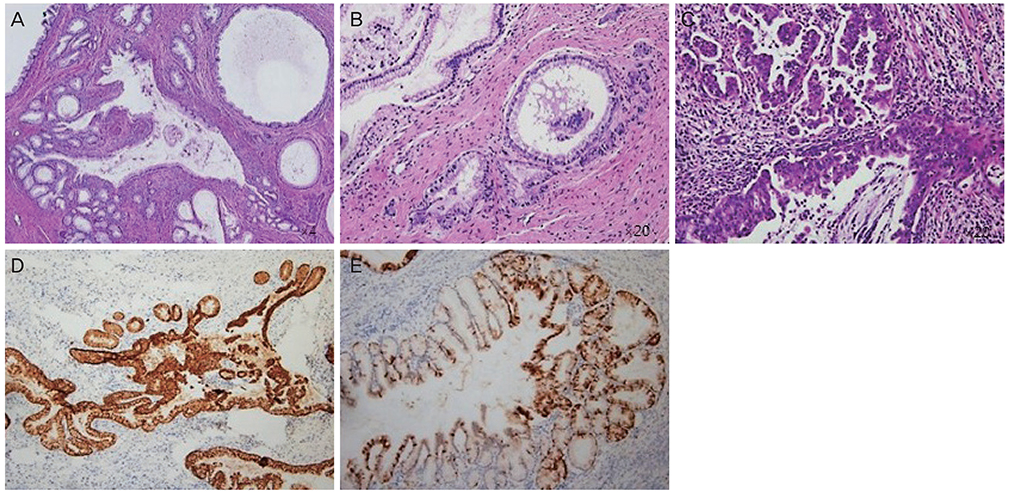Obstet Gynecol Sci.
2019 Nov;62(6):474-477. 10.5468/ogs.2019.62.6.474.
A rare case of gastric-type mucinous adenocarcinoma in a woman with Peutz-Jeghers syndrome
- Affiliations
-
- 1Department of Obstetrics and Gynecology, Cheil General Hospital & Women's Healthcare Center, College of Medicine, Dankook University, Seoul, Korea.
- 2Department of Obstetrics and Gynecology, Seoul National University Bundang Hospital, Seoul, Korea.
- 3Department of Obstetrics and Gynecology, Konkuk University School of Medicine, Seoul, Korea. joyfulplace@hanmail.net
- 4Department of Obstetrics and Gynecology, Hallym University Kangdong Sacred Heart Hospital, Seoul, Korea.
- 5CHA Gangnam Medical Center, CHA University, Seoul, Korea.
- 6Department of Pathology, Cheil General Hospital & Women's Healthcare Center, College of Medicine, Dankook University, Seoul, Korea.
- KMID: 2462127
- DOI: http://doi.org/10.5468/ogs.2019.62.6.474
Abstract
- Adenocarcinoma of the cervix is less common than squamous cell carcinoma. Minimal deviation adenocarcinoma (adenoma malignum) is considered an extremely well-differentiated variant of GAS. An association exists between GAS and Peutz-Jeghers syndrome, which is a rare autosomal dominant disorder characterized by mucocutaneous pigmentation and multiple hamartomatous polyps in the gastrointestinal tracts. The incidence of GAS in patients with Peutz-Jeghers syndrome is estimated to be 11-17%. We present a rare case of adenoma malignum, diagnosed using colposcopic biopsy in a woman with Peutz-Jeghers syndrome, which was histopathologically confirmed to be GAS after surgery.
MeSH Terms
Figure
Reference
-
1. Kurman RJ, Carcangiu ML, Herrington CS, Young RH. WHO classification of tumours of female reproductive organs. 4th ed. Lyon: International Agency for Research on Cancer (IARC);2014.2. Adegoke O, Kulasingam S, Virnig B. Cervical cancer trends in the United States: a 35-year population-based analysis. J Womens Health (Larchmt). 2012; 21:1031–1037.
Article3. Kaminski PF, Norris HJ. Minimal deviation carcinoma (adenoma malignum) of the cervix. Int J Gynecol Pathol. 1983; 2:141–152.
Article4. Giardiello FM, Trimbath JD. Peutz-Jeghers syndrome and management recommendations. Clin Gastroenterol Hepatol. 2006; 4:408–415.
Article5. Utsunomiya J, Gocho H, Miyanaga T, Hamaguchi E, Kashimure A. Peutz-Jeghers syndrome: its natural course and management. Johns Hopkins Med J. 1975; 136:71–82.6. Burt RW. Polyposis syndromes. Clin Perspect Gastroenterol. 2002; 5:51–59.
Article7. Young RH, Welch WR, Dickersin GR, Scully RE. Ovarian sex cord tumor with annular tubules: review of 74 cases including 27 with Peutz-Jeghers syndrome and four with adenoma malignum of the cervix. Cancer. 1982; 50:1384–1402.
Article8. Gilks CB, Young RH, Aguirre P, DeLellis RA, Scully RE. Adenoma malignum (minimal deviation adenocarcinoma) of the uterine cervix. A clinicopathological and immunohistochemical analysis of 26 cases. Am J Surg Pathol. 1989; 13:717–729.9. Giardiello FM, Brensinger JD, Tersmette AC, Goodman SN, Petersen GM, Booker SV, et al. Very high risk of cancer in familial Peutz-Jeghers syndrome. Gastroenterology. 2000; 119:1447–1453.
Article10. Gusserow AL. Ueber sarcoma des uterus. Arch Gynakol. 1870; 1:240–251.11. Silverberg SG, Hurt WG. Minimal deviation adenocarcinoma (“adenoma malignum”) of the cervix: a reappraisal. Am J Obstet Gynecol. 1975; 121:971–975.
Article12. Mikami Y, Kiyokawa T, Hata S, Fujiwara K, Moriya T, Sasano H, et al. Gastrointestinal immunophenotype in adenocarcinomas of the uterine cervix and related glandular lesions: a possible link between lobular endocervical glandular hyperplasia/pyloric gland metaplasia and ‘adenoma malignum’. Mod Pathol. 2004; 17:962–972.
Article13. Karamurzin YS, Kiyokawa T, Parkash V, Jotwani AR, Patel P, Pike MC, et al. Gastric-type endocervical adenocarcinoma: an aggressive tumor with unusual metastatic patterns and poor prognosis. Am J Surg Pathol. 2015; 39:1449–1457.14. Takatsu A, Shiozawa T, Miyamoto T, Kurosawa K, Kashima H, Yamada T, et al. Preoperative differential diagnosis of minimal deviation adenocarcinoma and lobular endocervical glandular hyperplasia of the uterine cervix: a multicenter study of clinicopathology and magnetic resonance imaging findings. Int J Gynecol Cancer. 2011; 21:1287–1296.15. Kojima A, Mikami Y, Sudo T, Yamaguchi S, Kusanagi Y, Ito M, et al. Gastric morphology and immunophenotype predict poor outcome in mucinous adenocarcinoma of the uterine cervix. Am J Surg Pathol. 2007; 31:664–672.
Article
- Full Text Links
- Actions
-
Cited
- CITED
-
- Close
- Share
- Similar articles
-
- Solitary Peutz-Jeghers type harmartomatous polyp in duodenum with gastric foveolar epithelium: a case report
- A Case of Hamartomatous Polyp without Peutz-Jeghers Syndrome Arising from Appendix
- Peutz-Jeghers syndrome: a new understanding
- A Case of Colon Cancer in Peutz-Jeghers Syndrome
- A Case of Peutz-Jeghers Syndrome with Intraductal Papillary Mucinous Carcinoma of Pancreas



